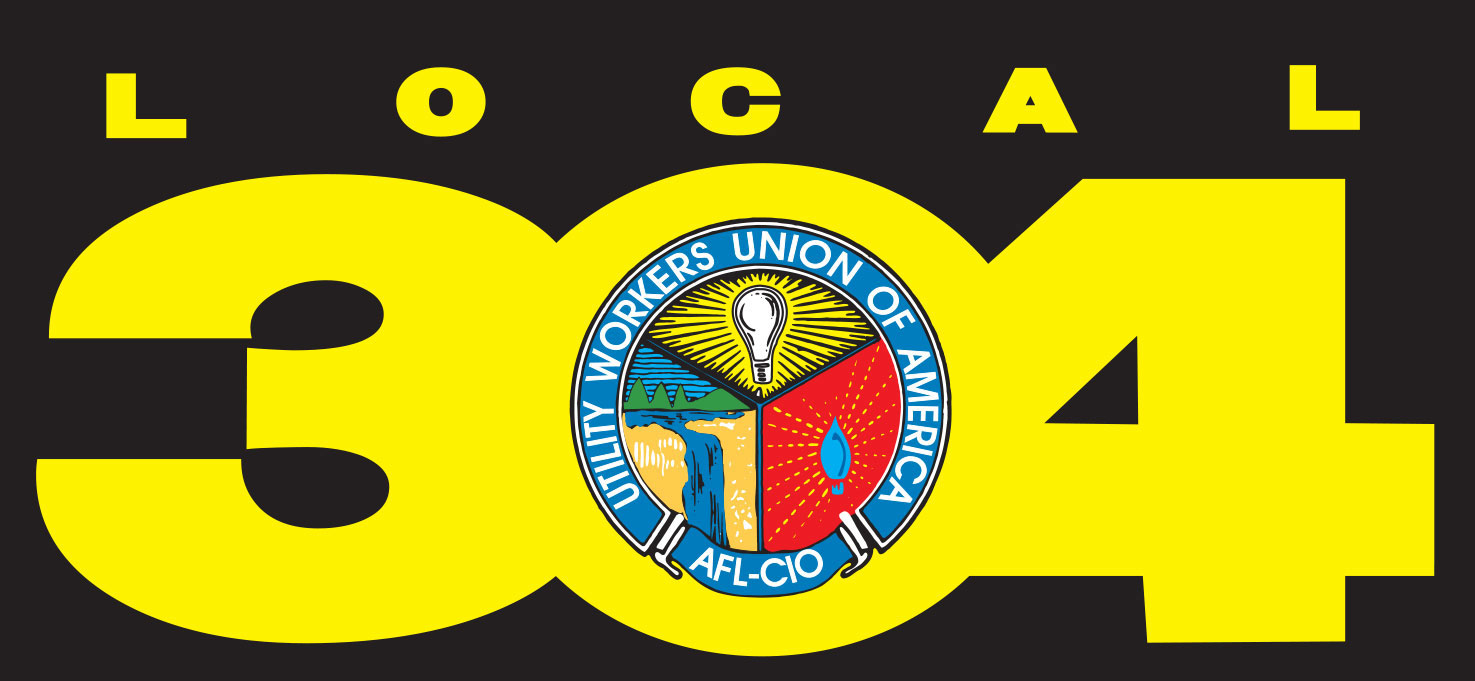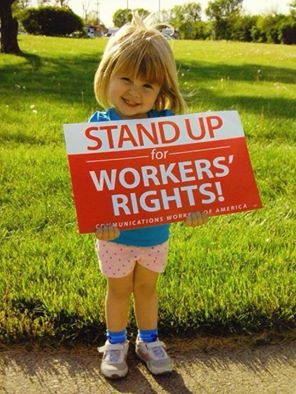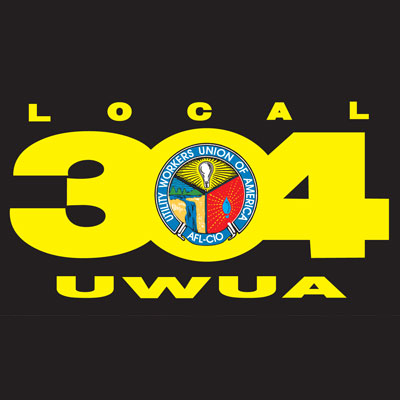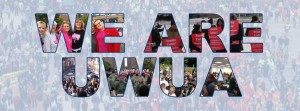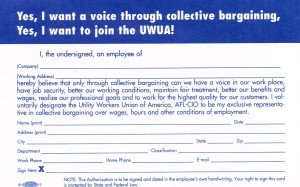Working Without Prosperity
Anyone who works deserves to have some small amount of success, even if that success only consists of the feeling one gets from being a self-supporting and contributing member of society.
West Virginians are in a special circumstance when it comes to work and prosperity. After decades of labor strife, a few coal miners did see a brief period of prosperity from their labor, but with the shrinkage of unionization and the influence of the UMWA, even that small window seems to be closing.
see a brief period of prosperity from their labor, but with the shrinkage of unionization and the influence of the UMWA, even that small window seems to be closing.
Before the industrial revolution and the discovery of our rich coal reserves, West Virginians were mainly farmers, trappers, and hunters. As our country moved deeper into industrialization, those who would seek to exploit our rich coal supply for their own greed moved into our state. They cheated landowners, bought political influence, and set up shop at the head of many hollows to establish mines and start hauling out West Virginia coal.
 West Virginians themselves have not benefited nearly as much as those absentee landlords who owned and operated the mines they worked in. As a matter of fact, West Virginia continues to be one of the poorest states in the nation, an odd happenstance that is in contrast to our rich energy and timber reserves. What workers of this state have reaped are pollution, destruction, and death.
West Virginians themselves have not benefited nearly as much as those absentee landlords who owned and operated the mines they worked in. As a matter of fact, West Virginia continues to be one of the poorest states in the nation, an odd happenstance that is in contrast to our rich energy and timber reserves. What workers of this state have reaped are pollution, destruction, and death.
On December 06, 1907, the Fairmont Coal Company mine in Monongha blew up, creating the worse mine disaster on record in the United States before or since. Official numbers set the count at 361 dead, but this was an era of child labor and the flood of immigrants who worked, undocumented, beside family members who were paid by the short ton for all the coal they loaded each shift. Many old timers claim that the count was far higher, possibly as many as 600, when taking these factors into account.
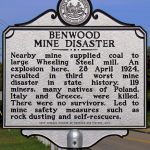 Then there is the 38 miners lost in the Boissevain Mine explosion in 1932, or the Consol #9 mine explosion in Farmington in 1968 that claimed 78 miners(the third such explosion in the mine formerly known as Jamison #9), or Holden, Nellis, Robinson-Ferrell, or Eccles #5 and #6, or the Clinchfield Coal Company’s Compass Mine at Dola, just up Route 20 from Lumberport that killed 22 men. Sago and Upper Big Branch are names of West Virginia mines added to the list of disasters visited upon the people of our state and that have become synonymous with tragedy and loss.
Then there is the 38 miners lost in the Boissevain Mine explosion in 1932, or the Consol #9 mine explosion in Farmington in 1968 that claimed 78 miners(the third such explosion in the mine formerly known as Jamison #9), or Holden, Nellis, Robinson-Ferrell, or Eccles #5 and #6, or the Clinchfield Coal Company’s Compass Mine at Dola, just up Route 20 from Lumberport that killed 22 men. Sago and Upper Big Branch are names of West Virginia mines added to the list of disasters visited upon the people of our state and that have become synonymous with tragedy and loss.
Lest anyone thinking that the plight of West Virginia workers lie only in the dark coal mines of our state, there is also the collapse of a scaffold in a  cooling tower, known as the Willow Island disaster, that killed 51 workers in 1978.
cooling tower, known as the Willow Island disaster, that killed 51 workers in 1978.
In fact, the worst industrial “accident” that ever occurred had nothing to do with coal mining, but happened in the New River Gorge area of West Virginia. This was the Hawks Nest Tunnel tragedy. This project of Union Carbide sought to divert the New River for power production to feed the plant in Alloy, West Virginia. Began at the height of The Great Depression, workers dug the 3 mile tunnel in record time, completing it 10 weeks ahead of schedule. The workers, desperate for gainful employment, either  did not know or understand that they were digging through Silica, a substance that causes silicosis in the lungs and is very damaging and even fatal. Many people have stated that it is impossible to quantify what a workers life is worth, but after years of lawsuits against the tunnel’s contractor, the settlement ranged from $400.00 for an unmarried black man to a $1000.00 for a married white man. In typical West Virginia fashion, the offending company settled $4 Million dollars in lawsuits for a paltry $130,000 dollars. Half of that settlement was claimed by the attorneys representing clients, who also recieved an added secret sum of $20K in the settlement insuring against any further lawsuits, and, on
did not know or understand that they were digging through Silica, a substance that causes silicosis in the lungs and is very damaging and even fatal. Many people have stated that it is impossible to quantify what a workers life is worth, but after years of lawsuits against the tunnel’s contractor, the settlement ranged from $400.00 for an unmarried black man to a $1000.00 for a married white man. In typical West Virginia fashion, the offending company settled $4 Million dollars in lawsuits for a paltry $130,000 dollars. Half of that settlement was claimed by the attorneys representing clients, who also recieved an added secret sum of $20K in the settlement insuring against any further lawsuits, and, on  the demand of the defendants, turned over all plaintiff files to them. In total it has been claimed that almost 500 workers died from exposure to silica dust. This number cannot be certified since tuberculosis was rampant throughout the country at the time and many may have died and been classified as victims of TB. What is known that death by overexposure to silica is a painful and miserable way to die, with one family member claiming that an affected relative actually kicked the bed they were dying in to pieces when in the throes of a fit of spasmodic coughing and gasping for air.
the demand of the defendants, turned over all plaintiff files to them. In total it has been claimed that almost 500 workers died from exposure to silica dust. This number cannot be certified since tuberculosis was rampant throughout the country at the time and many may have died and been classified as victims of TB. What is known that death by overexposure to silica is a painful and miserable way to die, with one family member claiming that an affected relative actually kicked the bed they were dying in to pieces when in the throes of a fit of spasmodic coughing and gasping for air.
Families of West Virginia workers also suffered indirectly, through the loss of the  bread winner and patriarch of the family, but also suffered directly from those who came to our state to rape the land, reap the resouces, and then leave like thieves in the night. Each incident described above represents grieving widows, orphaned children, heartbroken parents, and all the social and economic woes such conditions cause.
bread winner and patriarch of the family, but also suffered directly from those who came to our state to rape the land, reap the resouces, and then leave like thieves in the night. Each incident described above represents grieving widows, orphaned children, heartbroken parents, and all the social and economic woes such conditions cause.
Earthen dams had been simple and easy contructs for coal companies to capture coal wastes. That was until the Buffalo Creek Disaster in 1972. Pittston Coal had a dam at the head of a hollow on Buffalo Creek, WV. In a torrent of several days of  rain, the dam became sodden and soft. On the morning of February 26th, the dam burst. Many residents were still asleep when a wall of muddy coal waste laid waste to everything in it’s path An estimated 132 million gallons of water came roaring down the valley, killing 125 men, women, and children. 1,100 people were injured and 4,000 homes were destroyed. An emergency shelter was set up at the Man High School and survivors combed the wreckage looking for loved ones and lost possessions.
rain, the dam became sodden and soft. On the morning of February 26th, the dam burst. Many residents were still asleep when a wall of muddy coal waste laid waste to everything in it’s path An estimated 132 million gallons of water came roaring down the valley, killing 125 men, women, and children. 1,100 people were injured and 4,000 homes were destroyed. An emergency shelter was set up at the Man High School and survivors combed the wreckage looking for loved ones and lost possessions.
Pittston later claimed the disaster to be an, “act of God”.
 An elderly female resident replied, “I never saw God drive the first slate truck up the holler.”
An elderly female resident replied, “I never saw God drive the first slate truck up the holler.”
Again, in actions so typical of our state, one of the last acts of departing West Virginia Governor Arch Moore was a settlement of the multi-million dollar lawsuits against Pittston for the insulting sum of $1 million dollars.
Stories of the children who survived the disaster recall how anxious and nervous they would get everytime it rained.
 Why is all this worth recounting?
Why is all this worth recounting?
It’s because this is a history of labor in West Virginia. Despite the Mine Wars which shed some light on workers issues. West Virginians have, by and large, been poorly represented by local, state, and federal leaders, and exploited by ruthless corporations. It has been West Virginia workers blood that have purchased many of the country’s safety and health reforms, and it is those reforms that are under attack that we have to continue to fight for everyday.
The UMWA is one of the few unions to have any real success in this area. Those intrepid organizers for the UMWA braved the remote and rugged geography, faced down hired gun thugs, and brought a little social justice to exploited and abused workers in this state.
Another union that helped open the door for West Virginia workers is the Railroad Workers United, who represent railroad workers across North America, and fight the same issues as the rest of us.
It is this lack of representation that should inspire every worker in West Virginia to seek out a union of their choice and actively pursue joining. Unions are the purest forms of democracy in our country because they are ran by the workers, not politicians or absentee corporations. They are also an important source of vital information on issues affecting the industries they represent, giving workers information that is hard, if not impossible, to find anywhere else.
Unions that are organized and active act as checks and balances for people who work for a living and seem to be the ones largely ignored when political parties develop grand platforms promising prosperity and reform, but deliver more of the same year after year. Healthy and active unions hold these people to account for promises made in the heat of campaigns.
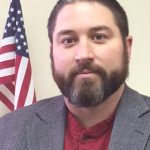
 The West Virginia AFL-CIO, with whom we are affiliated with, represents over 575 affiliated unions who fight for all West Virginia workers, whether they are union or not. Unions set the bar for wages, benefits, and working conditions for all workers. UWUA Local 304 would like to wish departing longtime President Kenny Purdue a happy retirement and welcome his replacement, Josh Sword, to the top job at the helm of West Virginia’s labor movement.
The West Virginia AFL-CIO, with whom we are affiliated with, represents over 575 affiliated unions who fight for all West Virginia workers, whether they are union or not. Unions set the bar for wages, benefits, and working conditions for all workers. UWUA Local 304 would like to wish departing longtime President Kenny Purdue a happy retirement and welcome his replacement, Josh Sword, to the top job at the helm of West Virginia’s labor movement.
Josh Sword Kenneth Purdue
(CLICK ON THE LINKS HIGHLIGHTED IN THE ARTICLE FOR MORE INFORMATION)
Why Union Jobs Matter!
There can be no doubt that there were more than the candidates taking center stage in the 2016 Election. Ahead of all the candidates and issues was a force greater than the accumulated individual parts and pieces. That force was anger.
Though almost 50% of Americans stayed home on Election Day, either due to apathy caused by the belief that their choice didn’t matter, or a fundamental feeling that they don’t matter; the rest of the voting public battled openly and advocated loudly for their choice of candidate.
The candidates themselves seemed fatally flawed. One candidate, a product of the ultra-rich elite who rode the back of political maverick and outsider; the other a well known face and political powerhouse whose service in her many posts and positions left a polarizing effect in the minds of the electorate.
To many, even of her own party, Hillary Clinton was the same as having no choice at all. Surprisingly, many in the other party viewed Donald Trump’s candidacy with the same ire and misgivings. Both Presidential hopefuls burned away the long standing colors associated with either party, colors thoroughly bleached out by the white hot anger of the voting public.
So why are Americans so angry?
Of all the issues broached during the 2016, income inequality was the one that resonated the most. The messenger, an old time radical and self described Democratic Socialist, became the lightening rod that energized his adopted party’s message. As the Democratic campaign wore on, Clinton’s rhetoric slowly began to change to the point of her trying to sound like Bernie Sanders.
Regardless of party affiliation, the message of income inequality was one that cut across those hard drawn party lines. The bottom line for almost all voters was that the American public is tired of paying high taxes to a government that seems to takes them for granted.
It’s a fact that unions built middle class America. Unions gave workers a voice, and that voice demanded that the people actually doing the work, while not getting rich, should at least be able to live decent lives and provide adequately for their families.
However, the attack on those wages and benefits that combine to make up a job that makes work pay are relentless. Americans were warned back during Bill Clinton’s Presidency about so called “Free Trade” (NAFTA, CAFTA, …) agreements, that the intent of exporting American economic success would open the door to importing third world wages and working conditions by trying to compete in markets that exploited workers and regimes that did not respect the rules of business, human rights, or the rule of law, in general.
Falling wages and decreased opportunities have hit the middle class hard. In households that are lucky enough to have one breadwinner with a good job, there is a drain on that family’s income in supporting immediate family who can’t find work that provides a decent living.
Forget the toys and hobbies many adults indulge in, more and more it’s taking both parents working full time to earn enough just to survive. Parents are juggling mortgages, bills, tuition, taxes, and everything else that takes cash to plug the holes that seems to always crop up. It seems that everything in our society is geared at squeezing more out of those who contribute the most.
This brings us back to the original problem, income inequality. This is where we see the great chasm that form up the two competing political philosophies.
One side blames social programs and handouts for our ballooning deficit, a situation promoted by the advocates of a progressive agenda.
The other side says corporate welfare and greed is to blame for the woes facing us as a nation.
One side wants to double down on trickle-down economics with yet even more tax breaks for the rich, while the other wants to return us to a system that punishes the successful with an aggressive tax hike. Neither side wants to compromise, so our country limps along in “safe mode” with no end in sight.
Unions are more relevant than ever. We are the frontline that fights for all workers. We fight for wages, working conditions, pensions, and most of all, safety.
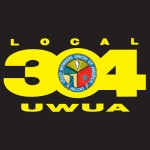 Whether you realize it or not, unions affected your employment at Harrison long before 304 certified as a union in 2010. Before 304, we had UWUA System Local 102 to our north, and Rivesville was union. These facts directly contributed to what wages and benefits would be set for Harrison. Rivesville’s union succumbed to fear of plant closure and a slick campaign that undermined the union and the company was able to bust that union. This left only System Local 102 as the gatekeeper protecting wages and benefits for Harrison. Since 2010, we’ve seen System Local 102 almost reduced to a lineman’s union with the closure of all the plants in their jurisdiction.
Whether you realize it or not, unions affected your employment at Harrison long before 304 certified as a union in 2010. Before 304, we had UWUA System Local 102 to our north, and Rivesville was union. These facts directly contributed to what wages and benefits would be set for Harrison. Rivesville’s union succumbed to fear of plant closure and a slick campaign that undermined the union and the company was able to bust that union. This left only System Local 102 as the gatekeeper protecting wages and benefits for Harrison. Since 2010, we’ve seen System Local 102 almost reduced to a lineman’s union with the closure of all the plants in their jurisdiction.
This is why UNION JOBS MATTER!
304 has been pushed into the position of being the primary defenders of what wages and benefits will be for plants in our geographical area. We’ve had a lot of help, from an embattled System Local 102, our longest and most loyal ally. As we’ve grown, we’ve also found new allies, such as UGWU Local 69 at Dominion and UWUA Local 537 representing employees of West Virginia American Water. We’ve also formed bonds with other unions within our merged company, most notably UWUA Local 270, as well as other trade unions.
304 is able to form these relationships because when we talk to other unions it’s blatantly obvious that we are not alone in the challenges and issues we all face. We have more in common than we do differences, making it clear that we can only face these challenges effectively as a united front and by looking out for each other.
Bargaining power comes from SOLIDARITY!
How many people have YOU, as a union member, helped, or are helping, because of the financial resources of having a good UNION job allows you? How many in your family depend on those wages and benefits you are able to provide them?
This why it is so important that you are UNION!
As a member of the UWUA, you take your place among other serious professionals who are our union Brothers and Sisters, whether they be teachers, firefighters, machinists, laborers, carpenters, pipefitters, ironworkers, steelworkers, electricians, auto workers, painters and plasters, and many others who long ago realized that as workers we have to band together to protect each other from those business forces that seek to make all of us economic wage slaves.
UNION JOBS MATTER!
Constitution Optional
Some may wonder why 304 would elect to have so many articles about the past on our website. The answer is that most people are ignorant (meaning uninformed, NOT stupid) about our labor history, not having been exposed to it in school or at home. This has left a gap in the public consciencesness of the many complex and unexplained ways social and political attitudes and trends can affect working people in real time.
Regardless of who you voted for, it’s undeniable that the 2016 election will go down as one of the most controversial in American history. So many allegations among so many unpopular candidates left us with an electorate and country with deep philosophical and social differences.
Media bias was one charge leveled by both campaigns against the other periodically throughout the race. The media took a beating, even literally, in trying to cover and convey each candidate’s platform.
Freedom of the Press is one of the most fundamental rights that our founding fathers agreed was important in making us a just and moral society. Over the years, this right has taken everything from potshots to downright sieges in one party or the other attempting to muzzle the opposition.
One successful suppression of opposition happened in Huntington, WV, on May 9th, 1912. A newspaper office was raided by militiamen, on the orders of then West Virginia Governor Henry Hatfield. Under the direction of Major Tom Davis, U.S. Troops laid waist to the printing company’s presses, typesettings, as well as any printed material already produced by the printer.
The staff of the printing company were placed under arrest, then the Sherriff was ordered to turn his prisoners over to the military, who were then hauled to jail in Charleston. They were held without due process of law, and never charged.
The miltary then proceeded to Editor-in- Chief Wyatt Henry Thompson’s private residence and, over the objections of the his wife and even the Sheriff, proceeded to ramsack the home and remove many private letters and correspondence without any type of search warrants or writs.
You would think something like this would be unthinkable in a Democratic society based on law and justice.
The business the printing company was engaged in was printing a pro-labor, pro-union newspaper, and also serving the printing needs of the local unions that were trying to organize in the area.
The bottom line is; while many politicians try to incite fear and ignite rage in the voting public, the only times that the rights of Americans have been directly attacked has been during times of labor and racial strife. This is why we, as union members, must realize that LABOR RIGHTS ARE CIVIL RIGHTS.
Rifles are still occasionally found buried in the soil of southern West Virginia, left by the miners who dared to march against the corrupt Sheriff of Logan County, Don Chafin, during the Battle of Blair Mountain. They left their rifles buried in the forest because they knew that the militia, who were called out by the governor, but, like the good Sheriff, were working with the forces of the coal operators and would immediately confiscate the weapons as soon as they walked off the mountain (so much for the 2nd Amendment).
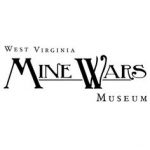 Truth is, our country’s sacred and much heralded Constitution was as much help to workers of the early 20th century, as a suitcase would be to a gorilla. Illegal arrests, kangaroo military courts, and even murder of men, women, and children were the norm for coal field families of West Virginia. Ruthless coal operators evicted families with small children out of their barely habitable homes and into the wilderness to die of starvation, disease, and exposure in tents pitched at the back of the hollows.
Truth is, our country’s sacred and much heralded Constitution was as much help to workers of the early 20th century, as a suitcase would be to a gorilla. Illegal arrests, kangaroo military courts, and even murder of men, women, and children were the norm for coal field families of West Virginia. Ruthless coal operators evicted families with small children out of their barely habitable homes and into the wilderness to die of starvation, disease, and exposure in tents pitched at the back of the hollows.
As if life hadn’t been hard enough, the coal barons did everything they could to make it even harder on the workers who dared to try and improve the miserable state of a hopeless way of life that seemed to consume the health and lives of all who toiled deep in the mines.
 Evidence that survived that period is on display for all to see at the West Virginia Mine Wars Museum, appropriately located in Matewan, WV. On display are the simple items used by mining families in the early 1900’s, like razors, and examples of the tents that many were forced to live in, plus a collection of coal company scrip (only redeemable at the company store), as well as many of the firearms from the period of the Mine Wars. Springfield rifles, chambered in either 30-40 Krag or 30-06 Springfield, as well as .45 caliber “Tommy” guns made famous by gangsters, and early Winchester lever action rifles that the coal companies bought in bulk to support the armies they created to oppress the miners. You can read the actual newspapers that celebrated the “Miners Hero”, Sid Hatfield. It was “Smiling Sid” who faced down the hated Baldwin-Felts agents in what would come to be known as the Matewan Massacre, only to be ultimately gunned down on the steps of the McDowell County Courthouse in Welch a year later by Baldwin-Felts agents (none of whom were ever arrested or charged).
Evidence that survived that period is on display for all to see at the West Virginia Mine Wars Museum, appropriately located in Matewan, WV. On display are the simple items used by mining families in the early 1900’s, like razors, and examples of the tents that many were forced to live in, plus a collection of coal company scrip (only redeemable at the company store), as well as many of the firearms from the period of the Mine Wars. Springfield rifles, chambered in either 30-40 Krag or 30-06 Springfield, as well as .45 caliber “Tommy” guns made famous by gangsters, and early Winchester lever action rifles that the coal companies bought in bulk to support the armies they created to oppress the miners. You can read the actual newspapers that celebrated the “Miners Hero”, Sid Hatfield. It was “Smiling Sid” who faced down the hated Baldwin-Felts agents in what would come to be known as the Matewan Massacre, only to be ultimately gunned down on the steps of the McDowell County Courthouse in Welch a year later by Baldwin-Felts agents (none of whom were ever arrested or charged).
If you are lucky enough to be in a union, the you owe it to yourself and your family to BE ACTIVE, and act in SOLIDARITY with your union Brothers and Sisters. When you hear a union officer saying that people fought and died for YOUR right to collectively bargain, they aren’t kidding.
Don’t believe all the bad press that claim unions to be outdated and dying.
Remember who owns the press.
Keep the faith in your union and each other. Don’t let the “charm campaign” of company owned stooges, or divide and conquer tactics employed by rich business moguls trying to pump up huge and unearned executive compensation or prop up sagging stock prices by cheating workers dissuade you in standing with those who toil daily right beside you.
As always, don’t just take OUR word for it, click on the links highlighted above to read for yourself
January’s Monthly Meeting Update
The first meeting for 2017 went off without a hitch. There was a good turn out from every department and Bernie LaBelle was there also. As always, we covered many different topics and had some catching up to do since our last meeting in November. There was a brief training after the meeting for some of the newer officers and stewards to help with transitioning into their new positions.
We started the meeting by going over some of the arbitration hearings we have had and where we stand on those. Bernie LaBelle explained the last arbitration which was just ruled on. He also covered the steps leading up to and where things go after arbitration hearings. We took a look back at what we have been dealing with the last year and talked about where we would like to see things go this year.
There were some things brought up in the meeting about contractors working our jobs, work we have done in the past going away, supervisors doing our work, etc. Please be reminded that we have a grievance process, and we need to use it. If you see something that should not go on get a fellow union member, takes notes, times, dates, who, when, where, and file a grievance. This applies to anything we might see out there, not just someone doing our work. It doesn’t matter what department this is happing in. If it is not your department and you feel funny about filing a grievance then talk to that department’s union steward. Remember, filing a grievance is not a bad thing, and it will not get you into any kind of trouble. It is the first step to fixing what is wrong in the workplace, contract, and it could even keep someone from getting injured on the job.
Thank you to all the members that participated in the Angel Tree this Year. We were able to meet our goal and a local family benefited from our generosity. Sometimes it is hard to think that in this day and age there are those families that don’t have much or children whose only food comes from the school meal program. I can assure you that this is still the case today and your contributions to the less fortunate are greatly appreciated.
If you would like to know more about what goes on, would like to participate in any of the programs, or don’t like the way things are going and want to help change things I encourage you to come to the monthly meetings. The meetings are the best place to keep up with what is going on across our plant, local union, and national union. Hope to see you next month.
Make The Call!
The UWUA is a great union. They are not a third party, as they have been portrayed by employers in their carefully prepared union-busting talking points. The UWUA is an organization that is dedicated to making the working lives of their members better. They do this by following through when workers elect to vote them as their exclusive bargaining representative.
(pictured: Larry Kelley and Rich Cossell)
UWUA Local 304 can testify to this. The UWUA was there when we decided to become affiliated with the Utility Workers Union of America, AFL-CIO. They were there when dragging contract negotiations and a pair of votes rejected paltry contract offers and opened the door for an ill concieved decertification vote. They were there when that vote re-affirmed, with results even stronger than the original union vote, that Harrison employees wanted to be Utility Workers.
In the end, UWUA Local 304 members made a choice to trust each other to look out for our own best interests. A seat at the table beats being on the menu!
From the first Authorization card that was signed to the most recent Regular Monthly Meeting, and everywhere in between; the UWUA has never broke their faith in the membership of Local 304.
UWUA Local 304 now has a contract. Do you?
It wasn’t easy, but through hard work and the assistance, support, and expertise of the UWUA National; UWUA Local 304 defied the odds and is now a functioning and active union. As such, we are fighting for our members, just as the UWUA did for us.
Who’s fights for you?
If you want to know what the UWUA can do for YOU, give UWUA National Organizer Larry Kelley a call at (724) 263-1345, or e-mail him at hemikelley@comcast.net. Each call and e-mail is confidential. Larry will be glad to answer your questions.
Larry was a long time member of UWUA System Local 102 as a lineman, and since then has devoted his time and efforts to give fellow utility workers the same advantage he had during his working career by helping them to achieve their goals of guaranteeing their future by joining the UWUA.
He’s just one of the many people UWUA Local 304 owes many thanks. Men like Larry, Rich Cossell, Bernie LaBelle, Bob Houser, Sam McKnight, George Manoogian, and all the way up to President Mike Langford; each took a personal interest and was totally invested in 304’s success. These are just a few to whom we owe our gratitude to. We also made many new friends in other UWUA Locals, all of them dedicated to the purpose of making Utility Workers lives better.
It’s happening at Boeing in South Carolina, Mercedes in Alabama, Nissan in Mississippi, VW in Tennessee, and other workplaces across the country. In the face of a massive “Right To Work” push by corporate owned politicians, workers are finding they trust each other more than they trust billionaire business executives to make each others lives better.
New NLRB rules make it easier, so what’s holding you back?
You can live in fear, or inspire it! Organize 2 Survive! Make the call!
Click the links above to learn more.
(click to enlarge)
